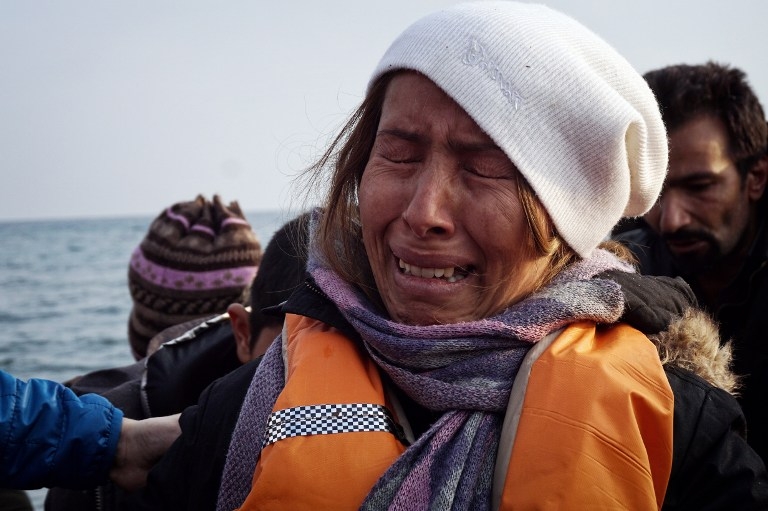VIDEO: Lesbos refugees say they will jump in sea if deported

LESBOS, Greece - Beko stood outside the Moria centre, trying to make sense of where to go next after a controversial plan to send migrants and refugees from Europe back to their countries came into effect earlier this week.
The 28-year-old from Baghdad, his Syrian wife and their two-month-old son are among hundreds of people who have arrived on dinghys and boats to Greece in recent days, after a deadline for the new EU-Turkey deal passed at midnight on Sunday.
For now, Beko's family and others are detained in Greek islands camps like Moria. Protests broke out here on Tuesday among an estimated 1,000 waiting to see whether Greek and European immigration authorities will allow them to apply for asylum in Greece or deport them back to Turkey when they are expected to start enforcing the plan on 4 April.
"We don’t need a rich country, we just need somewhere safe," Beko said, declining to give his last name. "We don’t need Germany even. If Greece can give me a room or something, a future, somewhere safe, we’ll stay here. If we can’t stay here, I’ll throw myself in the sea."
"Turkey is a bad country, sorry about that, but it’s a bad country," he said. "If they send us back from Turkey, Turkey will send us back to Iraq or Syria. We’ll die in Iraq, we’ll die in Syria."
As the protest erupted, recent arrivals yelled "We want papers!" and "Where are our human rights?" Greek police donned riot gear in preparation for violence, but the situation remained fairly calm.
The agreement has sparked criticism from the UN's refugee agency, which has said the plan violates human rights, and earlier this week suspended its activities in closed reception centres on the island that it said had become detention centres.
On Tuesday, the NGO Doctors Without Borders (MSF) announced it had suspended its activities in Moria, saying it refused to be part of a system that "has no regard for the humanitarian or protection needs of asylum seekers and migrants".
"Continuing to work inside would make us complicit in a system we consider to be both unfair and inhumane," Marie Elisabeth Ingres, MSF's Head of Mission in Greece, said in a statement.
Beko said he and his wife had been temporarily let out of the camp on Tuesday to visit a dentist in Mytilini, the capital of the island 10km away, and were about to go back into the centre.
"Inside here, it’s like a disaster. It’s like a prison," he said. "We sleep in a UN shelter, without a stove or heaters, just with one blanket each and on the ground. It’s very cold but what can we do? We don’t know about our future."
In the harbour at Mytilini, ferries continue to take a small number of refugees who arrived on the island before the Sunday deadline to the Greek mainland. On Tuesday night, as another ferry launched, volunteers and activists shouted and waved goodbye.
One hundred metres away, several dozen refugees who had tried to sneak onto the ferry with fake papers, sat despondently in Frontex vans and Greek police coaches as the boat pulled away. Soon after, they were driven back to Moria to await their fate with thousands of others.
Stay informed with MEE's newsletters
Sign up to get the latest alerts, insights and analysis, starting with Turkey Unpacked
Middle East Eye delivers independent and unrivalled coverage and analysis of the Middle East, North Africa and beyond. To learn more about republishing this content and the associated fees, please fill out this form. More about MEE can be found here.




